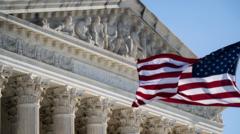In a significant legal confrontation, President Donald Trump is heading to the Supreme Court in an attempt to assert his power over federal agency leadership. The case centers around the firing of Hampton Dellinger, who headed the U.S. Office of Special Counsel and was dismissed via a brief email earlier this month. The dismissal has prompted Dellinger to sue the Trump administration, challenging the legality of his removal under federal laws designed to protect leaders of independent agencies from arbitrary dismissals outside of specific misconduct.
According to reports, Trump has dismissed more than a dozen inspectors general and thousands of federal employees, raising questions about the extent of his authority. Dellinger, who was nominated during President Joe Biden's administration, contends that his removal did not meet the legal criteria for dismissal dictated by federal law, which allows firing only in instances of neglect, malfeasance, or inefficiency.
Recently, a federal judge in Washington D.C. ruled to temporarily block Dellinger's dismissal, allowing him to remain in office while the case goes through the judicial system. Following this decision, the Trump administration sought to challenge the ruling in the U.S. Court of Appeals, where they were met with rejection. In response, the Justice Department has filed an emergency appeal to the conservative-majority Supreme Court to overturn the lower court's decision.
Sarah M. Harris, the acting solicitor general, justified the appeal by asserting that lower courts should not dictate the president's employment decisions regarding agency heads. She indicated that no precedent exists for such judicial intervention in executive hiring decisions in the nation's history.
Trump's battles to implement his policies, particularly concerning immigration and government spending, have encountered numerous legal hurdles, suggesting this Supreme Court challenge may not be isolated. As his administration continues to reshape the federal workforce, recent terminations have reportedly impacted at least 9,500 employees across various departments, including Health and Human Services and Veterans Affairs.
In an interesting twist, efforts to streamline the federal workforce are being coordinated by a task force led by Elon Musk, named DOGE, which is aimed at enhancing government efficiency amidst extensive cuts. As Trump’s presidency reflects on the capacity of executive power, the upcoming Supreme Court decision may have profound implications on the nature of agency leadership and the limits of presidential authority.




















